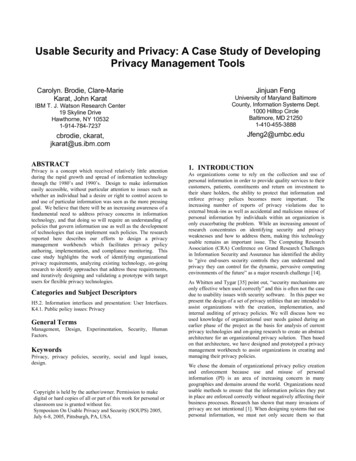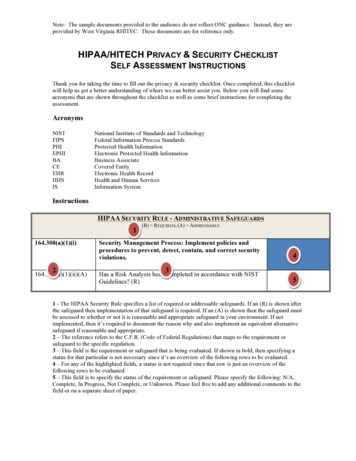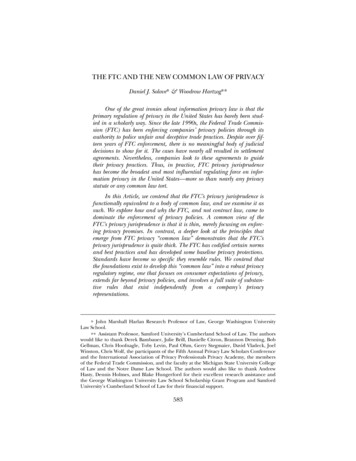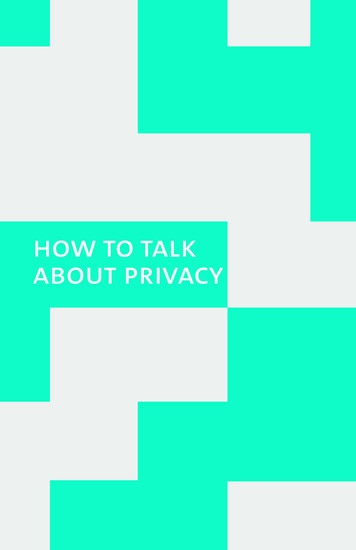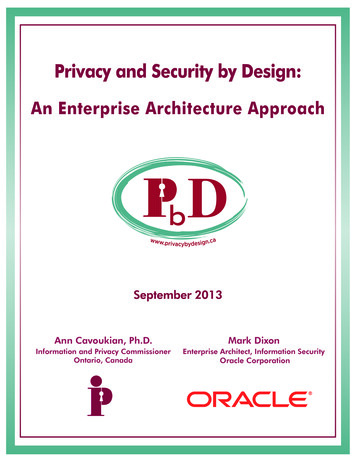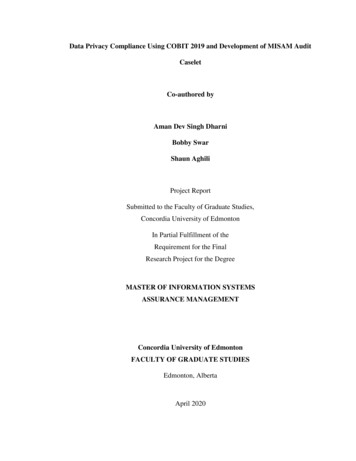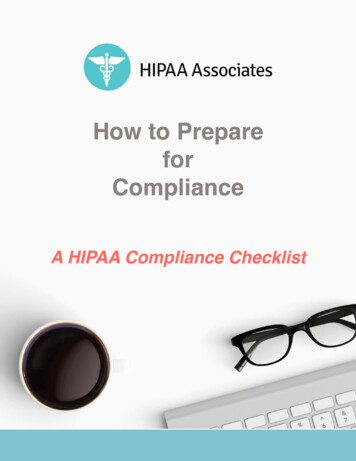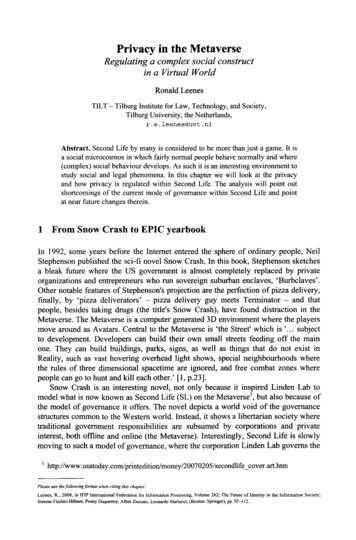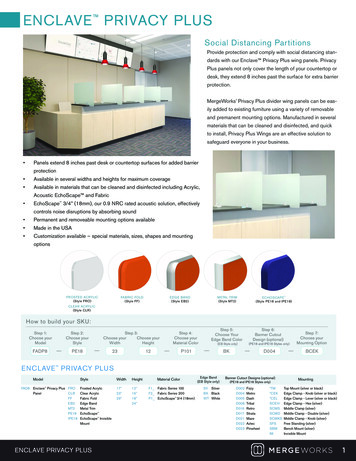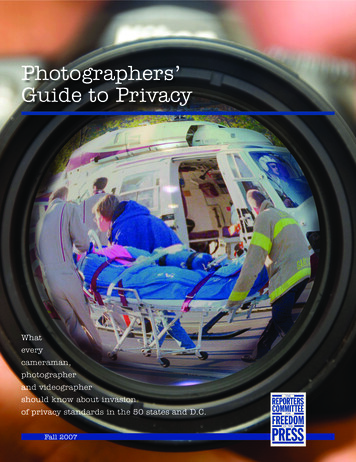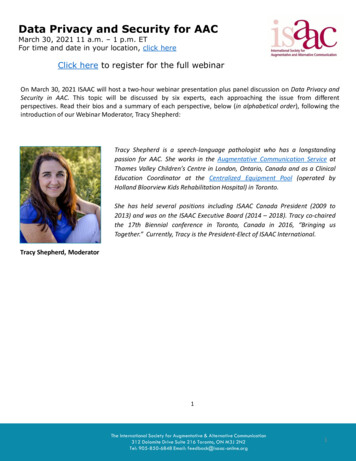
Transcription
Data Privacy and Security for AACMarch 30, 2021 11 a.m. – 1 p.m. ETFor time and date in your location, click hereClick here to register for the full webinarOn March 30, 2021 ISAAC will host a two-hour webinar presentation plus panel discussion on Data Privacy andSecurity in AAC. This topic will be discussed by six experts, each approaching the issue from differentperspectives. Read their bios and a summary of each perspective, below (in alphabetical order), following theintroduction of our Webinar Moderator, Tracy Shepherd:Tracy Shepherd is a speech-language pathologist who has a longstandingpassion for AAC. She works in the Augmentative Communication Service atThames Valley Children’s Centre in London, Ontario, Canada and as a ClinicalEducation Coordinator at the Centralized Equipment Pool (operated byHolland Bloorview Kids Rehabilitation Hospital) in Toronto.She has held several positions including ISAAC Canada President (2009 to2013) and was on the ISAAC Executive Board (2014 – 2018). Tracy co-chairedthe 17th Biennial conference in Toronto, Canada in 2016, “Bringing usTogether.” Currently, Tracy is the President-Elect of ISAAC International.Tracy Shepherd, Moderator1The International Society for Augmentative & Alternative Communication312 Dolomite Drive Suite 216 Toronto, ON M3J 2N2Tel: 905-850-6848 Email: feedback@isaac-online.org1
Data Privacy and Security for AACMarch 30, 2021 11 a.m. – 1 p.m. ETFor time and date in your location, click hereClick here to register for the full webinarRussell CrossRussell Cross is a speech-language therapist and the Language Systems ProductManager at PRC-Saltillo. A Psychology and Linguistics graduate from theUniversity of Lancaster in the UK, with a Post-Graduate qualification from theUniversity of Central England, he has worked in the field of AAC since 1984.Russell is a co-author of the Unity series of language application programs,author of the WordCore software, and developer of the Realize Language AACdata analysis website. He is a member of the Royal College of Speech andLanguage Therapists, ASHA, ISAAC, and the Assistive Technology IndustryAssociation (ATIA) Research Committee.In the field of AAC, the collection and analysis of client-generated data has been an integral part of goodpractice long before the invention of the array of high-technology devices now available to aid communication.The major difference between now and, say, 40 years ago, is that modalities for collecting data have changed,allowing for not only the accumulation of very large data sets but also for this to be done in a way that can beinvisible. For example, prior to having any capability to log data use in a device, it was always possible tomanually jot down what someone said and subject the written script to analysis, whereas now it is possible tolog time and content for every keystroke in an AAC device.The challenge practitioners in the field have to face is that of continuously re-evaluating how to adapt tomeeting the needs of (a) client-clinician confidentiality and (b) data privacy. The notions of “informed consent”and “privacy” are not new, but as technology evolves, the ways in which these can be protected and modifiedhave to be monitored. Even the very definition of “privacy” is unlikely to be the same today as it was in 1981,and the changing expectations of PWUAAC need to be taken into account if data logging for clinical andeducational purposes is to work both securely and effectively. And it is with the help of the AAC communitythat ISAAC can work towards improving solutions for data security and personal privacy at the levels of (a)clinical/educational practice, (b) technology, (c) training for the community, and (d) legal standards.2The International Society for Augmentative & Alternative Communication312 Dolomite Drive Suite 216 Toronto, ON M3J 2N2Tel: 905-850-6848 Email: feedback@isaac-online.org
Data Privacy and Security for AACMarch 30, 2021 11 a.m. – 1 p.m. ETFor time and date in your location, click hereClick here to register for the full webinarMelanie Fried-Oken, Ph.D. is a Professor of Neurology, Biomedical Engineeringand Otolaryngology at the Oregon Health & Science University (OHSU) andDirector of the REKNEW research projects (Realizing Expressive Knowledge inEveryone With Communication Impairments). As a leading international clinicianand researcher in the field of Augmentative and Alternative Communication(AAC), she provides expertise about Assistive Technology for persons withacquired disabilities who cannot use speech or writing for expression. She is PI onfederally funded grants to research communication technology for personswith dementia, ALS, and other neurodegenerative diseases, including atranslational R01 from NIH/NIDCD on brain computer interfaces forcommunication.Melanie Fried-OkenAs AAC technology continues to embed Natural Language Processing into devices to improve the rate ofcommunication and provide personalized language options to end users, it is critical that we have largedatabases with words produced by people who rely on the technology. The development of worddatabases presents many challenges related to privacy, identity, storage, and confidentiality that must beaddressed.People who rely on AAC embrace the technology for many different reasons. Those who learn to use AACas they develop language have different challenges from people who are losing their speech and languageskills and must rely on AAC technologies as new ways to express themselves. Each potential user hasreasons why personalized language models stored in their devices may be advantageous andsimultaneously dangerous. We recently completed a qualitative research study, where we collected datafrom 75 adults with neurodegenerative disease about their preferences for language storage related toidentity, agency, and privacy. We are beginning to analyze the data and find trends that should influencethe AAC field.3The International Society for Augmentative & Alternative Communication312 Dolomite Drive Suite 216 Toronto, ON M3J 2N2Tel: 905-850-6848 Email: feedback@isaac-online.org
Data Privacy and Security for AACMarch 30, 2021 11 a.m. – 1 p.m. ETFor time and date in your location, click hereClick here to register for the full webinarDave Hershberger is CEO of PRC-Saltillo, based in the US. His career has beendedicated to Assistive Technology. Trained as an Electrical Engineer, Dave developedAAC devices for Prentke Romich Company during the 1980s and early 90s. He thenfounded Saltillo Corporation in 1996. Over the past few years, he has brought thetwo companies together under the PRC-Saltillo umbrella.The collection and analysis of data enables us to create more effective and moreusable tools for people who use AAC. Take word prediction, for example. We uselanguage usage data collected from a large group of individuals to create an effective“off the shelf” prediction system. Then, by collecting data when someone is usingDave Hershbergerthe system, the system can “self-adjust” to correspond to the individual’svocabulary choices, speaking patterns, or even the conversation topic. As technology becomes moresophisticated, it becomes possible to monitor more aspects of how individuals interact with their systems. Thiscan lead to data-driven improvements in how devices are designed, adapted, and implemented.However, data collection can also be invasive. As manufacturers and professionals, we need to be transparentin specifying the data we would like to collect, who has access to it, how we protect its privacy, and how weuse it. We need to do a better job of educating on the benefits of the data collection, along with the associatedrisks. Ultimately, the decision needs to be with the individuals using the technology ̶ a reality made morecomplicated by the fact that many of the individuals who have the most to gain (and lose) are minors.4The International Society for Augmentative & Alternative Communication312 Dolomite Drive Suite 216 Toronto, ON M3J 2N2Tel: 905-850-6848 Email: feedback@isaac-online.org
Data Privacy and Security for AACMarch 30, 2021 11 a.m. – 1 p.m. ETFor time and date in your location, click hereClick here to register for the full webinarFil McIntyre is the Manager and Assistive Technology Lead for TechAbility – aservice that supports specialist settings in the UK. He consults with and deliversAssistive Technology training to colleges and adult support providers. Prior to this,Fil managed an Assistive Technology team at Beaumont College, a highlyspecialist college for post-19 students. He has also delivered training and supportto every post-16 college in Scotland, worked as an AT Trainer for InclusiveTechnology, and been an assistive technologist since before the term made it tothe UK! Fil lives in the Northwest of England where the sun occasionally shines sohe can head out for a hike in the Lake District.Fil McIntyreAt the webinar, Fil will discuss the conflict between data rights and human rights. Prompted by the loss of aniPad, Fil was concerned that over-enthusiastic data protection could lead to the safety and rights of people whouse AAC being in jeopardy. Those who require images may have many pictures and names stored on theirdevices. If the device is owned by an organization, this loss is considered a data breach. Organizations maytherefore be cautious about adding such data.Fil will outline a balanced approach to ensure that the safety or right to speak of people who use AAC is notimpaired, while ensuring minimal risk of privacy breaches.5The International Society for Augmentative & Alternative Communication312 Dolomite Drive Suite 216 Toronto, ON M3J 2N2Tel: 905-850-6848 Email: feedback@isaac-online.org
Data Privacy and Security for AACMarch 30, 2021 11 a.m. – 1 p.m. ETFor time and date in your location, click hereClick here to register for the full webinarDavid NiemeijerDr. David Niemeijer is the CEO and founder of AssistiveWare, based in Amsterdam.With over 20 years of experience, David is a pioneer in the field of Augmentativeand Alternative Communication (AAC) and Assistive Technology. He has createdsoftware for people with physical, vision, and communication challenges, includingthe award-winning Proloquo2Go software. Today, AssistiveWare serves over450,000 customers worldwide with products localized in many languages. Davidhas presented at major international Assistive Technology and Augmentative andAlternative Communication conferences such as AGOSCI, ASHA, Closing the Gap,Communication Matters, CSUN, ATIA, and ISAAC.People who use AAC have the right to the same level of privacy of conversation as speaking people. Datalogging, as currently implemented in many AAC products, dates from a time when asking for consent wasconsidered enough to protect the privacy of those who use AAC. Today’s best privacy approaches focus onprivacy by design over privacy by policy. This is about collecting only essential data and making sure thatwhenever possible this data is aggregated and anonymized to protect people’s privacy. What is not collected ordoes not leave the user’s device cannot do any harm. The AAC field can learn a lot from these practices.Developers can look into ways to better protect the privacy of people of all ages who use AAC, in relation toparents, teachers, and therapists. At the same time, they can provide the kind of insights that therapists andparents are looking for to help people who use AAC grow in their communication and language skills. Peoplewho use AAC more than anyone else depend on being able to express their most personal and intimate thoughtsthrough an electronic device. That gives a huge responsibility to the manufacturers and developers of suchproducts to ensure the autonomy and privacy of their users. Developers need to collaborate with people whouse AAC, therapists, and others to deliver relevant language and use insights without compromising the privacyof people who use AAC.6The International Society for Augmentative & Alternative Communication312 Dolomite Drive Suite 216 Toronto, ON M3J 2N2Tel: 905-850-6848 Email: feedback@isaac-online.org
Data Privacy and Security for AACMarch 30, 2021 11 a.m. – 1 p.m. ETFor time and date in your location, click hereClick here to register for the full webinarAlyssa Hillary Zisk (they/them/theirs) is an autistic doctoral candidate inInterdisciplinary Neuroscience at the University of Rhode Island in the US. Theyhave several forms of experience with AAC: personal part-time use, research in thecontext of AAC for speaking autistic adults, and research in the context of braincomputer interfaces for people with amyotrophic lateral sclerosis. Alyssa is anexperienced teacher, both face to face and online, and their apparent lack of eyecontact is not an artefact of webinars or camera placement.It is possible for an individual who uses AAC to have certain forms of privacy onAlyssa Hillary ZiskFacebook that we do not have in daily life. Type something on Facebook, chooseyour privacy settings, and post it. If you locked it to your friends, or to a subset ofyour friends, the claim is that no-one else will be able to see it. There are ways around it, but the design is notbuilt to say certain people you interact with will always be able to see everything you post, or everything youtype but decide not to post. You can block your therapist on Facebook. In fact, you probably should. Typesomething in an AAC app with a LAM file. Whether or not it is ever spoken, anyone with access to the file cansee what you wrote, and when. Any caregivers see it. Therapists can see it. This privacy invasion, which evenFacebook will let you prevent – remember, you can block anyone – is marketed as a feature. It will continue tobe marketed as a feature until AAC is marketed to users, not professionals. Designing and marketing for users,not for professionals, parents, or any other “stakeholders,” is a prerequisite to us getting actual privacy.7The International Society for Augmentative & Alternative Communication312 Dolomite Drive Suite 216 Toronto, ON M3J 2N2Tel: 905-850-6848 Email: feedback@isaac-online.org
Russell is a co-author of the Unity series of language application programs, author of the WordCore software, and developer of the Realize Language AAC data analysis website. He is a member of the Royal College of Speech and Language Therapists, ASHA, ISAAC, and the Assistive Technology Industry Russell Cross Association(ATIA) ResearchCommittee.
